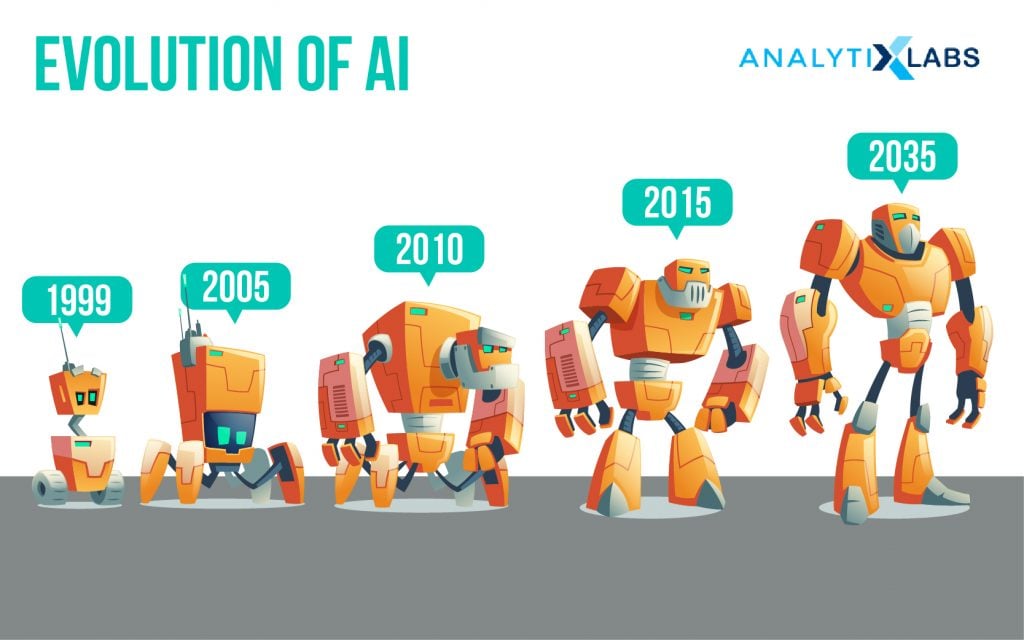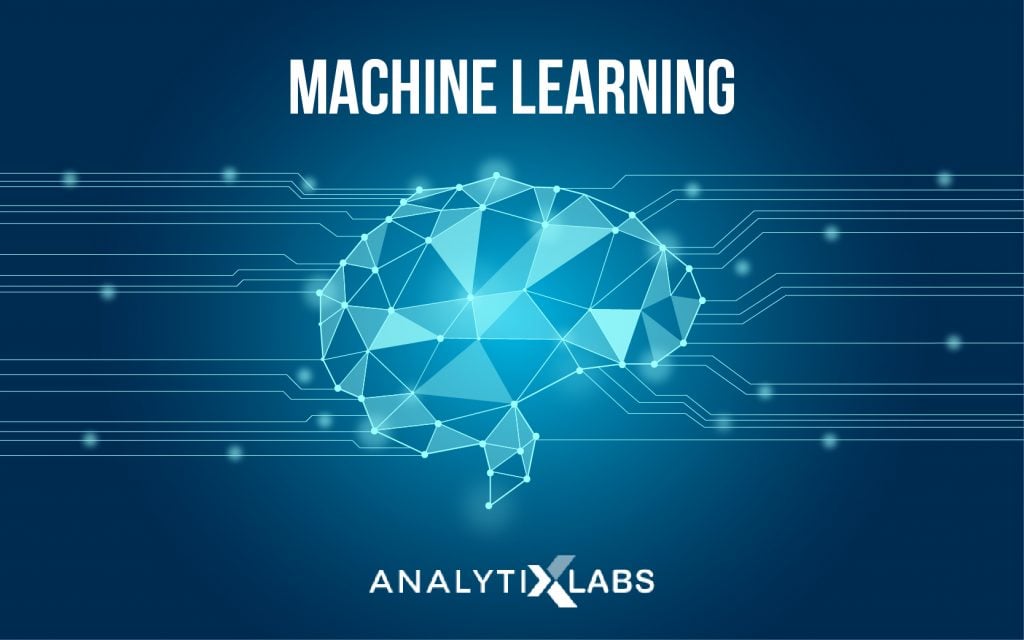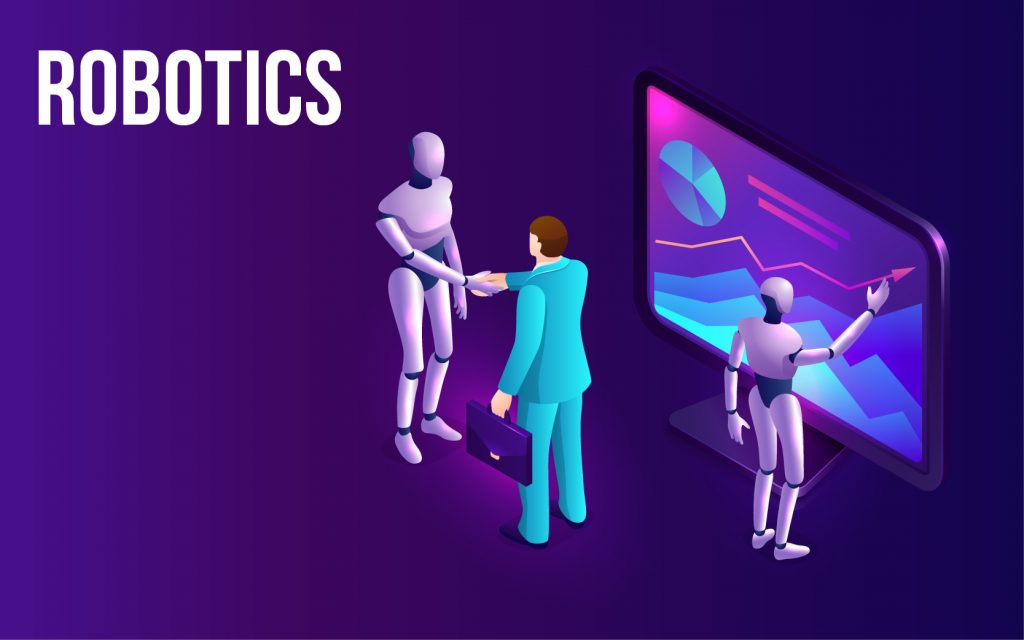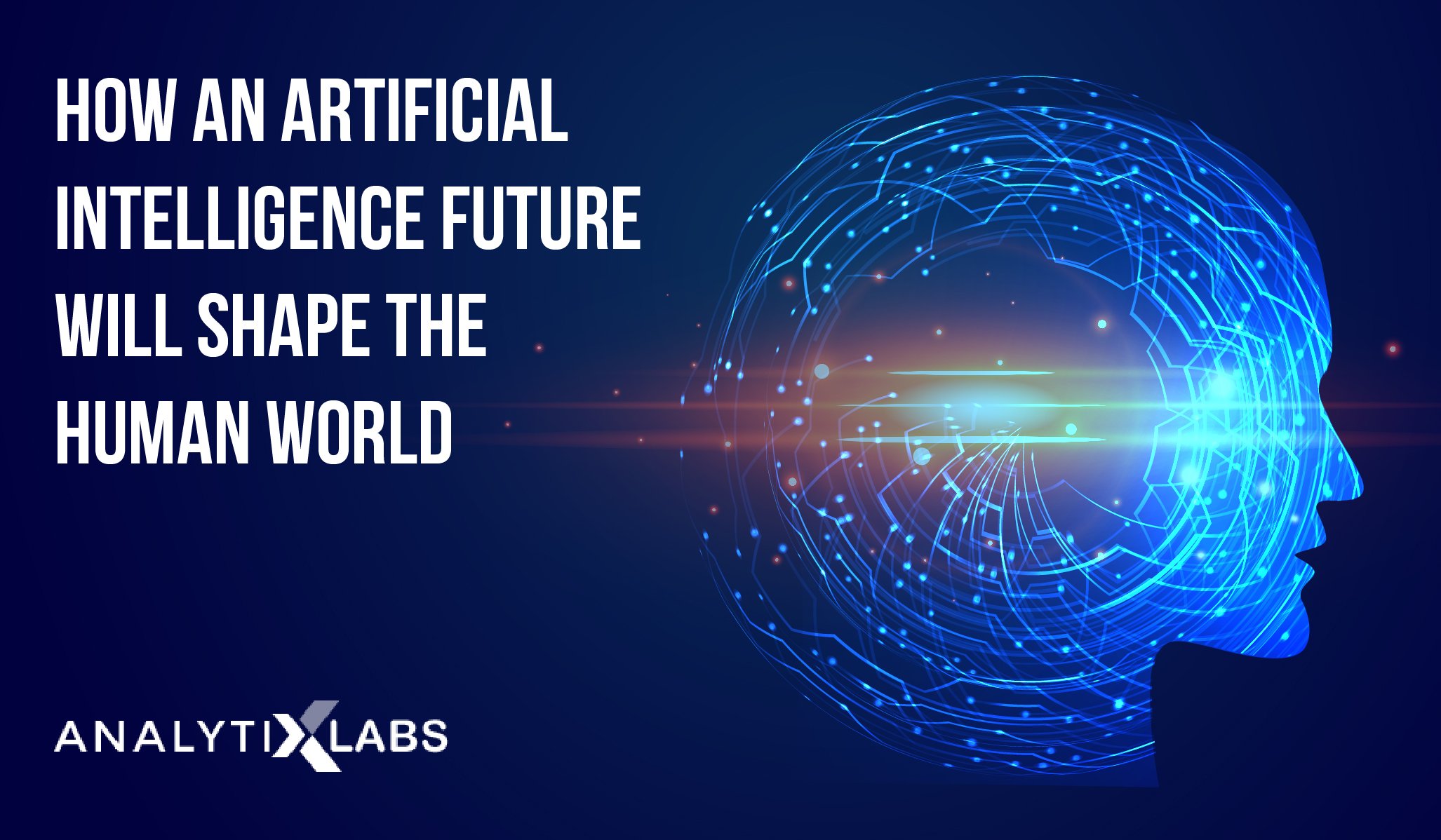Introduction
Are you still oblivious to the term ‘Artificial Intelligence?’ Let us break it out for you in simple terms. Artificial intelligence can be a machine or robot capable of performing tasks and making decisions that typically require human intelligence. In other words, AI is a machine’s ability to analyze its environment, external data, learning from that data, and use the experiences to achieve predefined goals. Read 101 of Artificial Intelligence (AI) – To Know more about AI as a Beginner?
The future of AI is capable of creating superpowers by combining machine learning and human intelligence. Who knows? Maybe someday we will be able to time travel?
But we are not here to talk about time travel and space robot armies. Instead, we are here to give you an insight into the foreseeable future where AI and machine learning will prosper alongside humans.
Want to know how artificial intelligence will change the future? Read more.
AnalytixLabs has been helping the organization to find useful insights into a problem and put forward smart AI enabled solutions. We use Artificial Intelligence day in and day out, and this is going to be our topic of discussion for today.
Evolution of AI

The past few years have seen the invincible growth of AI, which has enabled machines to think and act like humans. It has garnered tremendous attention from tech companies and is considered the next big shift in the technological world. Big tech such as Apple, Google, and IBM are investing millions of dollars in this concept keeping in mind the future scope of artificial intelligence.
The concept of AI was brought into existence centuries ago. In the 1800s, the discussion around AI began between scientists, mathematicians, and philosophers, which only led to myths, speculations, and vague depictions that can be seen in Mary Shelly’s famous novel “Frankenstein.”
It was not until 1956 when AI was truly explored in its robust scope and potential. Millions of dollars were invested in the artificial intelligence future, but due to the absence of robust computing technologies, the idea quickly came to a halt in the late 1980s. However, the 21st century picked up where the 80s left off. With advanced computing technologies and heavy processors, AI was brought to life, and that too, with improved algorithms.
You may also like to read: Who is the Father Of Artificial Intelligence?
Artificial Intelligence Future
Technology helps in boosting human capacities and shaping up their lifestyle. With smart machines integrated with real-time information and human intelligence, we are witnessing an era of technological surge that has opened numerous opportunities.
AI has successfully spread its roots in the technology sector and has seamless opportunities in other industries. However, some people still think that the future of artificial intelligence will strip humans of their jobs and income. They believe that machines will take over the workplace, and humans will suffer unemployment.
But the truth is far from this assumption. The emergence of AI will open doors to new industries that we could have never imagined and help entrepreneurs keep up with the changing marketing trends in real time. With the help of new AI tools, businesses will enhance their operations, customer experiences and automate the work process.
When you think of autonomous operations facilitated by AI, driverless cars and robotics come to mind. However, artificial intelligence’s future applications will be beyond any limit. Transportation, healthcare, manufacturing, education, and customer service are some of the sectors that have already felt AI’s presence in their day-to-day operations.
Soon, organizations will rely heavily on AI systems for their daily interactions, data analysis, and automating business operations. The coming decade will see the impact of cognitive capabilities and creativity of AI on digital transformation.
You may also like to read: What Is the Future of Data Science and Artificial Intelligence?
Data Analytics
What does the future scope of artificial intelligence have to do with data analytics?
AI, combined with machine learning, will help achieve better insights from a pile of data. The business gathers as much data as possible to drive effective results. But, making sense out of large datasets becomes challenging when done manually. This is the problem that AI will resolve.
Artificial intelligence will help data engineers prepare the data, clean it, and make it accurate. In addition, AI can automate most of the tasks of data engineers making the process cheaper and more efficient.
Data Scientists responsible for designing and building various models based on relevant predictions can also win big with machine learning. Artificial intelligence future scope has a lot in store for data scientists where they will work together to create different models based on different predictions with utmost accuracy.
When Data Scientists include AI and automation as part of the decision-making process, the results will be accurate, dynamic, and adaptable to changing events in real-time.
AI systems are fully capable of gathering data from hundreds of sources, analyzing the data, and offering logical predictions. In marketing, AI will help analyze data about your customers to identify their behavior, preferences, and needs.
You may also like to read: Complete Guide on the Artificial Intelligence Course Syllabus
Machine Learning

But what exactly is Machine Learning? Is it a part of AI, and how will it define the artificial intelligence future?
Machine learning is an AI application that continually gives systems and machines the ability to learn and improve using past experiences. It focuses on developing computer programs that can learn from the data and apply the learnings for better future outcomes.
AI uses machine learning to observe the available data and identify patterns that will help make better decisions in different scenarios. Machine learning aims to make computers and systems more capable of learning automatically without any human interruption or intervention.
Designing accurate models requires the ability to process massive data to come to a possible scenario. Machine learning can make the process faster and easier with its competent learning abilities and algorithms. Systems programmed with machine learning can make non-programmed decisions based on the data observed in the past. However, deploying such discipline and training the program generally requires more time and resources to work effectively.
Machine Learning algorithms and cognitive technologies are major factors in deciding artificial intelligence’s future scope.
Deep Learning
Deep Learning is a part of Machine Learning that uses algorithms inspired by the functions and structure of the human brain. It is an essential element of AI in interpreting data, as the human brain does.
Deep learning is extremely beneficial to data scientists who collect, analyze, and interpret large amounts of data. In simple words, deep learning focuses on automating predictive analysis that is crucial in determining the artificial intelligence future. While traditional algorithms used in machine learning are linear, deep learning is infused with complex and hierarchical algorithms.
Computer programs containing deep learning must have access to massive training data to acquire a higher level of accuracy. The data has to pass through numerous layers of processing and hence the name deep learning.
The chatbots that you see on websites are built from the ground up using deep learning models. Not only this, but medical researchers are also using this data science to detect problems in human cells.
You may also like to read: Fundamentals Of Neural Networks & Deep Learning
NLP – Natural Language Processing
The cognitive abilities of machines have been made possible with natural language processing. NLP successfully marries AI with linguistics, which enables people to talk to machines to interact with humans.
NLP is a branch of AI that primarily deals with reading, understanding, and interpreting human language. The chatbots and voice-activated platforms are some of the examples in AI that embrace the NLP technology.
Natural language processing uses syntax, semantics, morphology, and pragmatics to understand the meaning of a written text or speech. Computer science turns this knowledge into machine learning algorithms that can work out the cognitive problems in a computer program.
NLP has changed the way humans interact or communicate with computers and will continue to do so, affecting the future of AI. It was not a long time ago that the mere idea of communicating with a machine used to sound absurd. However, with technological advancements and linguistics knowledge, NLP has quickly become a prominent field within AI growing rapidly.
Robotics

Robotics is a branch of technology that deals with designing and constructing human-like machines called robots.
Ever thought how robots can perform tasks like humans?
It is because of their engineered brain that is made of AI. Robots have inbuilt sensors that help them to move or interact with the external environment. Artificial intelligence gives robots the ability to navigate, perform tasks, and make calculated decisions. Robots learn how to do a task from humans with the help of the applications of machine learning.
Artificially intelligent robots have been deployed across various sectors, including manufacturing, healthcare, and transportation. There are also domestic robots that are capable of doing household chores. That sounds interesting, right?
Artificial intelligence future will do wonders for the robotics market. Smarter robots with endless potential will be designed and created in the future. People fear that robots will replace humans in the coming future. However, instead of being alarmed by these innovations, we must embrace the change.
Impact of AI on the Future of Humanity
Digital life is transforming the human world where machines will do most of the jobs humans used to do. AI systems have dispersed to more than half of the human population, unlocking newfound opportunities previously unimagined.
Where some people are in favor of AI, some think that artificial intelligence future will threaten humanity. However, AI is just a technology, and no technology is either good or bad. It’s how it is used that makes the difference.
The future of artificial intelligence will augment human capacities and give a better future to everyone. For example, high-frequency algorithm trading by AI machines will remove the need for complex decision-making by humans. AI can also predict climatic changes and natural calamities, solving a wide range of environmental issues. Moreover, many of the hazardous jobs humans are now doing will soon be taken over by machines.
Artificial intelligence future applications in the healthcare sector will deploy robots to work companions to the doctors. These robots will help in diagnosing and treating several diseases. The health-related data that AI will capture in the coming years will help build effective public health programs and thus give a healthier future to everyone.
You may also like to read: 10 Advantages and Disadvantages of Artificial Intelligence
Conclusion
AI is a blessing to humanity and will continue to be so in the future as well. Offering new AI tools to entrepreneurs will open new business lines, creating new jobs and opportunities for everyone. Soon enough, AI will be an indispensable part of your everyday life which will save you time, money, and efforts.
In the end, it is important to say that AI is just a technology. Its implications and benefits will be defined by us only. How artificial intelligence will change the future depends upon the actions we take today. It would be safe to say that AI systems are intelligent, progressive, and adaptable without challenging the qualities that make humans human.
FAQs – Frequently Asked Questions
Q1. What was life before AI?
Before AI, there were no smartphones, smartwatches, or Bluetooth devices. There were only labor-intensive tasks, and productivity was also low. Machines needed human commands and intervention to work optimally. The advent of AI has made everything simpler and more accessible. It is improving our skill sets and productivity by fueling the slow-moving industries. However, it is hard to say anything about life before AI as it is still flourishing. Check out this blog to know about the top 15 real-world applications of Artificial Intelligence & Uses of AI
Q2. How does AI work?
AI mingles large amounts of data with powerful processing and algorithms to look for a similar pattern and learn from it. AI enables computer programs to learn automatically from the data without any human intervention. The intelligent algorithms in AI give human-like capabilities to machines to facilitate better decision-making.
Related: Components Of Artificial Intelligence – How It Works?
Are you excited about how the future will look like with AI? We hope that we have given you a little insight into how AI is transforming the future. Be part of this revolution and take your first step with our Globally Certified Artificial Intelligence Course. Feel free to drop your queries in the comment section below, and we will get back to you with answers.
You may also like to read:
1. Know about Artificial Intelligence Career Paths | Job Roles & Skills
2. How to Learn Artificial Intelligence? Get Started With AI
3. What Is Eligibility for Artificial Intelligence Course?
4. What Is Knowledge Representation In Artificial Intelligence?









1 Comment
Great Blog! Thanks for sharing this awesome knowledge with us.